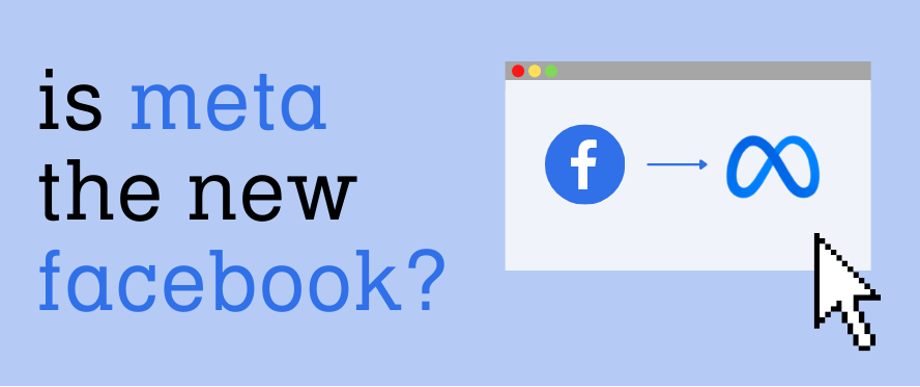Author: Carol Li, Graphics: Nina Tagliabue
The BRB Bottomline
The tech giant formerly known as Facebook has adopted a new name, Meta, along with a new focus and goal. This article aims to discuss the implications of this “metaverse” along with the potential effects that this shift will have on society and the way we view our lives.
Most people have either heard of, used, or are currently using the popular social media platform called Facebook. Some may think that this platform and everything that Facebook offers has benefited their life and well-being, while about 360 million others have reported that it has negatively impacted their sleep, work, relationships, and other day-to-day activities. No matter what your opinion is on this tech giant, this household name will soon disappear. On October 28, 2021, Mark Zuckerberg announced that Facebook would be changing its name to Meta.
Why is Facebook Rebranding? What is Meta?
In his 3 minute video announcing the big news, Zuckerberg is seen proudly presenting a futuristic vision for the company. Inspired by the concept of virtual reality, the “metaverse” will act as the world for your online self. From walking around in your virtual home to talking to coworkers in the virtual office, the “metaverse” is a world where one can go without physically having to move. Zuckerberg claims to be rebranding in order to bring people closer together in a more accessible way at the forefront of technology. But is this exciting new development truly exciting to all?
What is Meta, Really?
Before we get into the implications that Meta may have on our lives, let’s talk about the cutting-edge technology that has been developing to allow people to access the “metaverse.” Oculus VR is a subsidiary of Meta that produces virtual reality headsets and accessories. Originally used for gaming and entertainment, one will be able to access workrooms, sporting events, and many more with Quest, a virtual reality headset that can run games and software wirelessly. Next, Spark AR is a product in development that would enable one to see in augmented reality, which adds virtual effects to photos and videos. And lastly, smart glasses are exactly what they sound like. This wearable technology will allow one to record audio and video, right from your glasses. Like doorways to a new world, all three of these products are different ways a user will be able to access the “metaverse.”
Concerns for The “Metaverse”
A few people, including Facebook investor Roger McNamee have spoken out about their reservations towards the “metaverse.” Not only does he call this virtual world dystopian, but he also expresses concerns over the amount of control that Zuckerberg will have over the internet. He is skeptical due to Facebook’s preceding misinformation scandals and believes that regulators should have jumped in to make choices for the platform, instead of allowing it to operate freely. Additionally, according to four Chinese researchers at the Institute of United States Studies, the experience could “negatively affect teenagers’ development, it could be used by “lawbreakers” to produce addictive digital drugs, and could also lead some people to detach from the real world.”
Science or Sci-Fi?
One of my favourite novel series, The Mortality Doctrine Series by James Dashner, rubs elbows with Zuckerberg’s “metaverse.” The first novel in the series, The Eye of Minds written in 2013, takes place in a dystopian world where people live in a virtual reality called the “VirtNet.” In this world, people can play games, earn money, and do everything they can in real life. Facebook’s vision for the “metaverse” sure sounds a lot like this idea. In five to 10 years, Facebook’s original platform could be completely lost to Meta.
Take-Home Points
Not only did Facebook change its name to Meta, but it also brought up some intriguing questions and possibilities for the eventual goal of a virtual interface. So far, Meta is simply a branding strategy. However, through the development of new technological products, Zuckerberg has given us hints for the future. A world or “metaverse” based completely in the cloud may be unimaginable to some and a dream come true to others. Through a series of new technologies, one will slowly be able to immerse themselves into the “metaverse” and create their ideal lives. But how far will people go, and how much will they spend without fully knowing what they have purchased, to chase a dream that can now become a [virtual] reality?


It’s interesting to reflect back on this transition now that it has been almost a year since the article was written and Meta has become a widely accepted concept.
It’s interesting to look back on this article now that it has been a year and Meta has become a widely accepted new term.